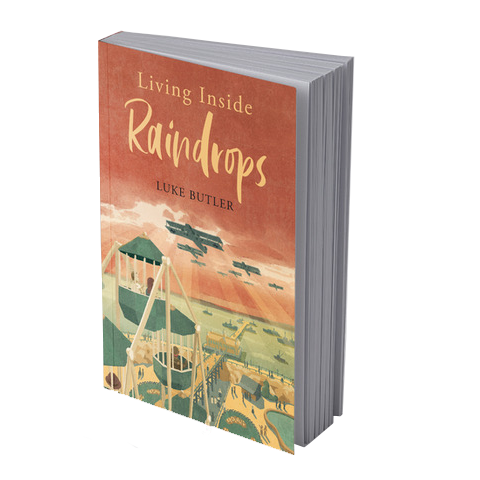When Luke Butler chose to work with The Book Edit, we were thrilled. Passionate about his subject and a born storyteller, it was clear he had huge potential. We were very happy to hear news of his publishing deal and delighted when he agreed to tell us more about his path to publication.
Living Inside Raindrops: On the Road to Publication by Luke Butler
“Writing can often be the easy part, it’s just you and your subjective assessment of your own work. It is what follows that can be all so difficult.
I started writing as a form of therapy. I lost my dad suddenly at a young age and subsequently, and somewhat subconsciously, this event threaded its way into my debut novel: Living Inside Raindrops.
Spanning four years; a proposal, a marriage, a house move and the birth of my first child, the book was ready for the world. Or so I thought.
At completion, I believed I had created a great paean for generations of readers and scholars to dissect and debate, the apotheosis of my life thus far. Then I opened the door. Knowing very few avid readers, I discovered The Book Edit.
Feedback is as essential to the process as having ink in your pen. It shone light on my novel as readable art, not just a journey in my head. After receiving my developmental edit from The Book Edit, I was challenged and I adapted my work dramatically. Yet another year passed, but this time I was actually ready for the world to have my book.
The romanticism to be published always outweighed my inclination to self-publish. Partly due to a fantastical belief someone else could share a passion in my novel, and partly because having a printed paperback copy in a dusty bookshop, one that could live on beyond my own lifetime, was an ideal too great to forgo. It also somewhat naively puts you amongst titles created by your great idols and predecessors.
So, with self-publishing on the back burner, I purchased the latest edition of the Writers' and Artists' Yearbook and spent nights making a shortlist spreadsheet of all those with an interest in Historical Fiction, as well as those willing to take unsolicited material. Given my book was set during WW1 I thought up the notion of emailing my shortlisted publishers and agents as the clock chimed 11:11.
Having prepared my individually personalised query letters, along with the first three chapters (where requested) I sent the emails out in unison, subtly referencing in each one that 11:11 had been a constant haunting reminder for me over the years to complete my manuscript!
Another naïve belief I had at the time was that given I am a filmmaker (I run my own company; Nirvana Studios), I could awe publishers with the book trailer I had created, blinding over my writing faults. I must have sent fifty or more selective emails across the course of that week, prepared for the rejection and often templated denunciations that I would soon receive.





